- Home
- Robert Graves
Goodbye to All That Page 31
Goodbye to All That Read online
Page 31
The eighteenth century owed its unpopularity largely to its Frenchness. Anti-French feeling among most ex-soldiers amounted almost to an obsession. Edmund, shaking with nerves, used to say at this time: ‘No more wars for me at any price! Except against the French. If there’s ever a war with them, I’ll go like a shot’ Pro-German feeling had been increasing. With the war over and the German armies beaten, we could give the German soldier credit for being the most efficient fighting-man in Europe. I often heard it said that only the blockade had beaten the Fritzes; that in Haig’s last push they never really broke, and that their machine-gun sections held us up long enough to cover the withdrawal of the main forces. Some undergraduates even insisted that we had been fighting on the wrong side: our natural enemies were the French.
At the end of my first term’s work, I attended the usual college board to give an account of myself. The spokesman coughed, and said a little stiffly: ‘I understand, Mr Graves, that the essays which you write for your English tutor are, shall I say, a trifle temperamental. It appears, indeed, that you prefer some authors to others.’
A number of poets were living on Boar’s Hill; too many, Edmund and I agreed. It was now almost a tourist centre, dominated by Robert Bridges, the Poet Laureate, with his bright eye, abrupt challenging manner, and a flower in his buttonhole – one of the first men of letters to sign the Oxford recantation of war-time hatred against the Germans. Dr Gilbert Murray lived there, too, gentle-voiced and with the spiritual look of the strict vegetarian, doing preliminary propaganda work for the League of Nations. Once, as I sat talking to him in his study about Aristotle’s Poetics, while he walked up and down, I suddenly asked: ‘Exactly what is the principle of that walk of yours? Are you trying to avoid the flowers on the rug, or are you trying to keep to the squares?’ My own compulsion-neuroses made it easy for me to notice them in others. He wheeled around sharply: ‘You’re the first person who has caught me out,’ he said. ‘No, it’s not the flowers or the squares; it’s a habit that I have got into of doing things in sevens. I take seven steps, you see, then I change direction and go another seven steps, then I turn around. I consulted Browne, the Professor of Psychology, about it the other day, but he assured me it isn’t a dangerous habit. He said: “When you find yourself getting into multiples of seven, come to me again.”’
I saw most of John Masefield, a nervous, generous, correct man, very sensitive to criticism, who seemed to have suffered greatly in the war, as an orderly in a Red Cross unit; he was now working on Reynard the Fox. He wrote in a hut in his garden, surrounded by tall gorse-bushes, and only appeared at meal-times. In the evening he used to read his day’s work over to Mrs Masefield, and they corrected it together. Masefield being at the height of his reputation at the time, a constant stream of American visitors washed against his door. Mrs Masefield protected ‘Jan’. She came from the North of Ireland, and put a necessary brake on Jan’s generosity and sociability. We admired her careful housekeeping, and the way she stood up for her rights where less resolute people would have shrunk. As an example: some neighbours of ours had a particularly stupid Airedale; they were taking it for a walk when a wild rabbit ran across the road from the Masefield’s gorse plantation. The Airedale dashed at the rabbit, and missed as usual. The rabbit, not giving it sufficient credit for stupidity and slowness, doubled back; but found the dog not yet recovered from its mistake and ran right into its open jaws. The dog’s owners, delighted at the brilliant performance of their pet, retrieved the rabbit, which was a small and inexperienced one, and took it home for the pot. Mrs Masefield had been watching through the plantation fence. This not being, strictly, a public road, the rabbit was legally hers. That evening they heard a knock at the door. ‘Come in, oh, do come in, Mrs Masefield!’ She had called to demand the skin of her rabbit. Mrs Masefield’s one extravagance was bridge; she used to play at a halfpenny a hundred, to steady her play. But she was a considerate landlord to us, and advised Nancy to keep up with me intellectually, if she wished to hold my affections.
Another poet on Boar’s Hill was Robert Nichols, one more neurasthenic ex-soldier, with his flame-opal ring, his wide-brimmed hat, his flapping arms, and a ‘mournful grandeur in repose’ (the phrase comes from a review by Sir Edmund Gosse). Nichols served only three weeks in France, with the gunners, and got involved in no show; but, being highly strung, he got invalided out of the army and went to lecture on British war-poets in America for the Ministry of Information. He read Siegfried’s poetry and mine, and started a legend of Siegfried, himself, and me as the new Three Musketeers, though the three of us had never once been together in the same room.
That winter, George and Ruth Mallory invited Nancy and myself to go climbing with them. But Nancy could not stand heights and was having another baby; and I realized that my climbing days were over. I could never again now deliberately take chances with my life. In March, the baby arrived and we called him David. My mother was overjoyed to have secured the first Graves grandson. My elder brothers had only girls; here, at last, was an heir for the family silver and documents. At Jenny’s birth she had condoled with Nancy: ‘Perhaps it is as well to have a girl first, to practise on.’ Nancy was determined to have four children; they were to resemble the children in her drawings, and be girl, boy, girl, boy, in that order. She intended to get it all over with quickly; she believed in young parents with families of three or four children fairly close together in age. She had her way exactly, but began to regret her marriage, as a breach of faith with herself – a concession to patriarchy. She wanted somehow to be dis-married – not by divorce, which was as bad as marriage – so that she and I could live together without any legal or religious obligation to do so.
I now met Dick again, for the last time, and found him disagreeably pleasant. He was up at Oxford, about to enter the diplomatic service, and so greatly changed that it seemed absurd to have ever suffered on his account. Yet the caricature likeness to the boy I had loved persisted.
28
THE first time I met Colonel T. E. Lawrence, he happened to be wearing full evening dress. That must have been in February or March 1920, and the occasion was a guest-night at All Souls’, where he had been awarded a seven-years’ Fellowship. The formality of evening dress concentrates attention on eyes, and Lawrence’s eyes immediately held me. They were startlingly blue, even by artificial light, and never met the eyes of the person he addressed, but flickered up and down as though making an inventory of clothes and limbs. I was only an accidental guest and knew few people there. Lawrence, talking to the Regius Professor of Divinity about the influence of the Syrian Greek philosophers on early Christianity, and especially of the importance of the University of Gadara close to the Lake of Galilee, mentioned that St James had quoted one of the Gadarene philosophers (I think, Mnasalcus) in his Epistle. He went on to speak of Meleager, and the other Syrian-Greek contributors to the Greek Anthology, whose poems he intended to publish in English translation. I joined in the conversation and mentioned a morning-star image which Meleager once used in rather an un-Greek way. Lawrence turned to me. ‘You must be Graves the poet? I read a book of yours in Egypt in 1917, and thought it pretty good.’
This was embarrassing, but kind. He soon began asking me about the younger poets: he was out of touch with contemporary work, he said. I told him what I knew.
Lawrence had not long finished with the Peace Conference, where he acted as adviser to the Emir Feisal, and was now tinkering at the second draft of The Seven Pillars of Wisdom, his Fellowship having been granted him on condition that he wrote the book as a formal history of the Arab Revolt.
I used to visit his rooms in the mornings between lectures, but not before eleven o’clock or half past, because he worked by night, going to bed at dawn. Though he never drank himself, he would always send his scout to fetch me a silver goblet of audit ale. Audit ale, brewed in the College, was as soft as barley-water but of great strength. Prince Albert of Schleswig-Holstein had once come down to Oxford
to open a new museum; he lunched at All Souls’ before the ceremony, the mildness of the audit ale deceived him, and later that afternoon they took him back to the station in a cab with the blinds drawn.
I knew nothing definite of Lawrence’s wartime activities, though my brother Philip had been with him in the Intelligence Department at Cairo in 1915, making out the Turkish Order of Battle. I did not question him about the Revolt, partly because he seemed to dislike the subject – Lowell Thomas was now lecturing in the United States on ‘Lawrence of Arabia’ – and partly because of a convention between him and me that the war should not be mentioned: we were both suffering from its effects and enjoying Oxford as a too-good-to-be-true relaxation. Thus, though the long, closely-written foolscap sheets of The Seven Pillars were always stacked in a neat pile on his living-room table, I restrained my curiosity. He occasionally spoke of his archaeological work in Mesopotamia before the war; but poetry, especially modern poetry, was what we discussed most.
He wanted to meet what poets there were, and through me came to know, among others, Siegfried Sassoon, Edmund Blunden, Masefield, and, later, Thomas Hardy. He frankly envied poets. He felt that they had some sort of secret which he might be able to grasp and profit from. He made Charles Doughty his chief hero and got an introduction to him through Hogarth, Curator of the Ashmolean Museum, whom he regarded as a second father. Lawrence envisaged the poet’s secret as a technical mastery of words rather than as a particular mode of living and thinking. I had not yet learned enough to be able to dispute this, and when I did begin to learn, some years later, found Lawrence difficult to convince. To him, painting, sculpture, music, and poetry were parallel activities, differing only in the medium used. Lawrence told me: ‘When I asked Doughty why he had made that Arabian journey, his answer was that he had gone there “to redeem the English language from the slough into which it has fallen since the time of Spenser”.’ These words of Doughty’s seem to have made a great impression on Lawrence, and largely account, I think, for his furious keying-up of style in The Seven Pillars.
Vachel Lindsay, the American poet, an extremely simple man – Middle-Western clay with a golden streak – came to Oxford, and I persuaded Sir Walter Raleigh, the Professor of English Literature, to let him have a lecture hall for a poetry-reading. Everyone enjoyed the performance, which was an exercise in elocution and mime, not a reading. Afterwards, Lawrence invited Lindsay and his old mother and myself to lunch in his rooms. Lawrence’s scout, scandalized to hear that Lindsay belonged to the Illinois Anti-Saloon League, asked permission to lay on his place a copy of verses composed in 1661 by a fellow of the College. One stanza ran:
The poet divine that cannot reach wine,
Because that his money doth many times faile,
Will hit on the vein to make a good strain,
If he be but inspired with a pot of good ale.
Mrs Lindsay had been warned by friends to comment on nothing unusual that she met at Oxford, and when Lawrence brought out the College gold service in her honour, she took this to be the ordinary thing at a University luncheon party – apologized for it as being of no great antiquity: but the College had been patriotic during the Civil War and melted down all its plate to help pay King Charles’s expenses while he made Oxford his headquarters.
Lawrence’s rooms were dark and oak-panelled, with a large table and a desk as the principal furniture. There were also two heavy leather chairs, simply acquired. An American oil-financier had come in suddenly one day when I was there and said: ‘I am here from the States, Colonel Lawrence, to ask a single question. You are the only man who will answer it honestly. Do Middle-Eastern conditions justify my putting any money in South Arabian oil?’
Lawrence, without rising, quietly answered: ‘No.’
‘That’s all I wanted to know; it was worth coming for. Thank you, and good day!’ In his brief glance about the room he missed something and, on his way home through London, chose the chairs and had them sent to Lawrence with his card.
Other things in the room were pictures, including Augustus John’s portrait of the Emir Feisal, which Lawrence, I believe, bought from John with the diamond he had worn as a mark of honour in his Arab headdress; his books, including a Kelmscott Chaucer, three prayer-rugs, the gift of Arab leaders, one of them with a lapis-lazuli sheen on the nap; the Tell Shawm station bell from the Hedjaz Railway; and on the mantelpiece a four-thousand-year-old toy – a clay soldier on horseback from a child’s grave at Carchemish, where Lawrence had dug before the war.
I was working on a new book of poems, which reflected my haunted condition; it appeared later under the title of The Pierglass. Lawrence made a number of suggestions for improving these poems, most of which I adopted. He behaved very much like an undergraduate at times. One day I happened to visit the top of the Radcliffe Camera and look down on the roofs of neighbouring colleges. From a pinnacle of All Souls’ fluttered a small crimson Hedjaz flag: Lawrence had been a famous roof-climber when up at Jesus College twelve years before this. He told me of two or three schemes for brightening All Souls’ and Oxford generally. One was for improving the rotten turf in the Quadrangle; he had suggested at a College meeting that it should be manured or replaced; no action was taken. He now proposed to plant mushrooms on it, so that they would be forced to returf the whole extent; and consulted a mushroom expert in town. But the technical difficulties of mushroom culture proved to be great, and Lawrence went away to help Winston Churchill with the Middle-Eastern settlement of 1922 before they could be overcome.
Another scheme, for which he enlisted my help, was to steal the Magdalen College deer. We would drive them one early morning into the small inner quadrangle of All Souls’, having persuaded the College to answer the Magdalen protests with a declaration that it was the All Souls’ herd, pastured there from time immemorial. Great things were expected of this raid, but we needed Lawrence as the stage-manager; so it fell through when he left us. However, he engineered a successful strike by the College servants for better pay and hours, and such a thing had never happened before since the foundation of the University. Lawrence also proposed to present the College with a peacock which, once accepted, would be found to bear the name ‘Nathaniel’ – after Lord Curzon, an enemy of Lawrence’s, and Vice-Chancellor of the University. One morning I went to his rooms, and he introduced me to a visitor there: ‘Ezra Pound: Robert Graves – you will dislike each other,’ he said.
‘What’s wrong with him?’ I asked afterwards, having felt very uncomfortable in Pound’s presence.
‘They tell me that he’s Longfellow’s grand-nephew, and when a man’s a modernist that takes some living down.’
At the same time Lawrence was getting to know the leading painters and sculptors, and trying to grasp their secret, too. He used to sit as a model, to see what they made of him, and compare the results.
Recently, I saw Sir William Orpen’s version – a curious almost libellous magnification of a seldom-seen element in Lawrence’s character – a sort of street-urchin furtiveness. It counter-balances Augustus John’s too sentimentally heroic portrait.
Professor Edgeworth, of All Souls’, avoided conversational English, persistently using words and phrases that one expects to meet only in books. One evening, Lawrence returned from a visit to London, and Edgeworth met him at the gate. ‘Was it very caliginous in the Metropolis?’
‘Somewhat caliginous, but not altogether inspissated,’ Lawrence replied gravely.
I remember having tea with him at Fuller’s Tea Shop, and the scandal he caused by clapping his hands for the waitress in oriental fashion. And one afternoon he rang the station bell from his window into the Quadrangle. ‘Good God,’ I said, ‘you’ll wake the whole College!’
‘It needs waking up.’
We planned to collaborate in a burlesque on contemporary writers, in the style of a Government Blue-book. I said: ‘First we must get a Blue-book and study it.’ He agreed to buy one next time he went to London. When he asked
at the Stationery Office for a Blue-book, the clerk asked: ‘Which Blue-book? We have hundreds.’
‘Whichever you like.’
Mistaking his indifference for guilty embarrassment, the clerk handed him the report of a Royal Commission on Venereal Disease.
I teased him once for standing on the fender over the fire; I pretended that he did it to make himself look taller. He denied this hotly, insisting that the onus of proving oneself of any use in the world lay with tall people like myself. This encouraged me to a ragging pretence of physical violence; but I immediately stopped when I caught the look in his face. I had surprised his morbid horror of being touched.
I took no part in undergraduate life, seldom visiting St John’s except to draw my Government grant and Exhibition money; and refused to pay the College games’ subscription, as being unfit for games myself and having no leisure to watch them. Most of my friends were at Balliol and Queen’s, and Wadham had a prior claim on my loyalty.
At this time I had little to do with the children; they were in the hands of Nancy and the nurse. Nancy felt that she needed some activity besides drawing, but could not decide what. One evening, in the middle of the long vacation, she suddenly said: ‘I must get away out of all this at once. Boar’s Hill stifles me. Let’s go off on bicycles somewhere.’
We packed a few things and rode off in the general direction of Devon. The nights were coldish and, not having brought any blankets, we bicycled by night and slept by day. We rode across Salisbury Plain in the moonlight, passing Stonehenge, and several deserted army camps which had an even more ghostly look. They could provide accommodation for a million men: the number of men killed in the British and Overseas Forces during the war. Finding ourselves near Dorchester, we turned aside to visit Thomas Hardy, whom we had met not long before when he came to get his honorary doctor’s degree at Oxford. Hardy was active and gay, with none of the aphasia and wandering of attention that we had noticed in him there.

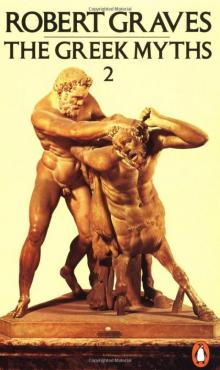 The Greek Myths, Volume2
The Greek Myths, Volume2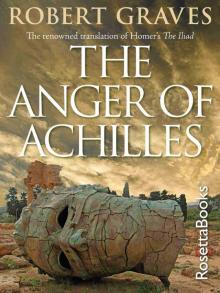 The Anger of Achilles: Homer's Iliad
The Anger of Achilles: Homer's Iliad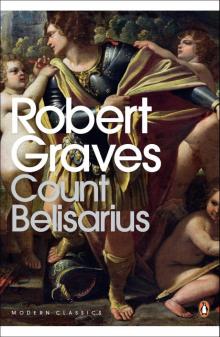 Count Belisarius
Count Belisarius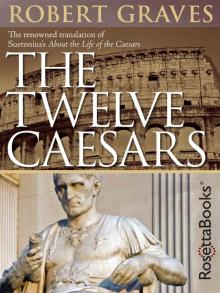 The Twelve Caesars
The Twelve Caesars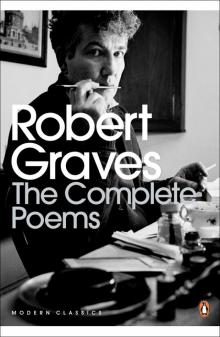 Complete Poems 3 (Robert Graves Programme)
Complete Poems 3 (Robert Graves Programme)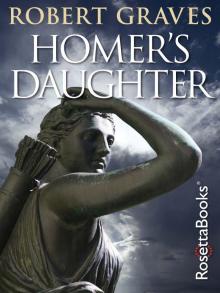 Homer's Daughter
Homer's Daughter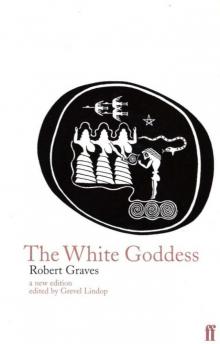 The White Goddess
The White Goddess Goodbye to All That
Goodbye to All That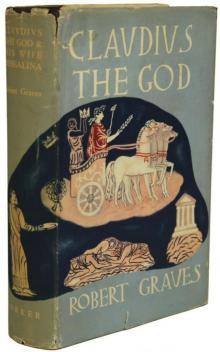 Claudius the God and His Wife Messalina
Claudius the God and His Wife Messalina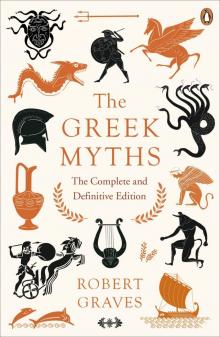 The Greek Myths
The Greek Myths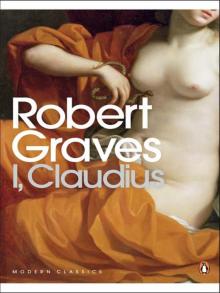 I, Claudius
I, Claudius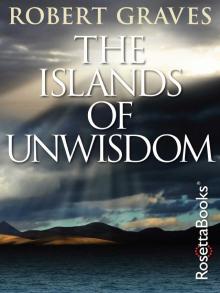 The Islands of Unwisdom
The Islands of Unwisdom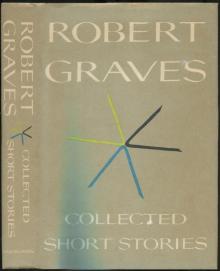 Complete Short Stories
Complete Short Stories The Golden Fleece
The Golden Fleece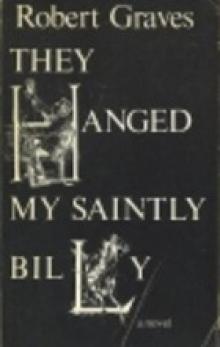 They Hanged My Saintly Billy
They Hanged My Saintly Billy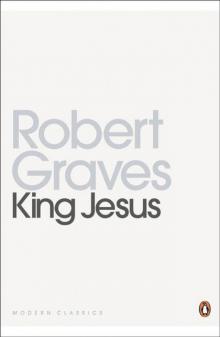 King Jesus
King Jesus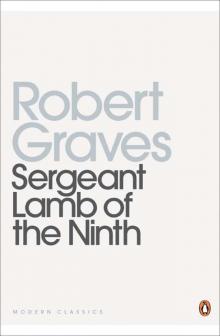 Sergeant Lamb's America
Sergeant Lamb's America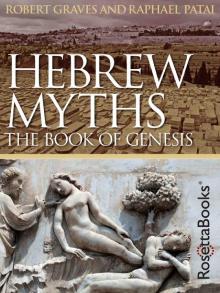 Hebrew Myths: The Book of Genesis
Hebrew Myths: The Book of Genesis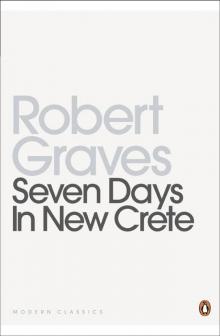 Seven Days in New Crete
Seven Days in New Crete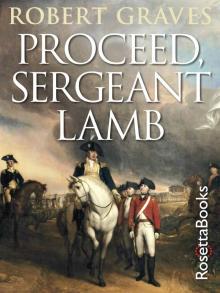 Proceed, Sergeant Lamb
Proceed, Sergeant Lamb Claudius the God
Claudius the God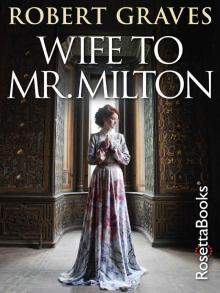 Wife to Mr. Milton
Wife to Mr. Milton The Complete Poems
The Complete Poems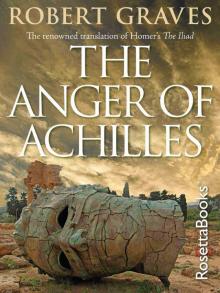 The Anger of Achilles
The Anger of Achilles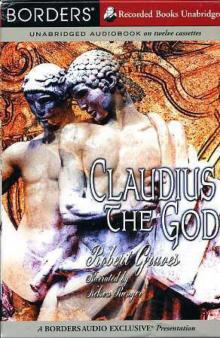 Claudius the God c-2
Claudius the God c-2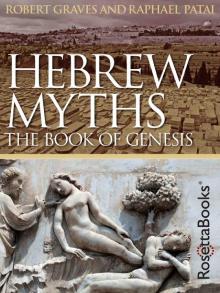 Hebrew Myths
Hebrew Myths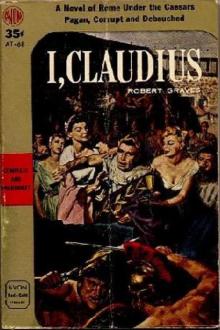 I, Claudius c-1
I, Claudius c-1 The Greek Myths, Volume 1
The Greek Myths, Volume 1